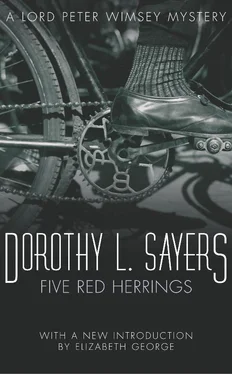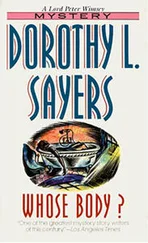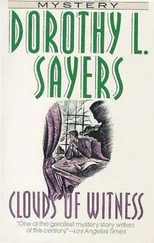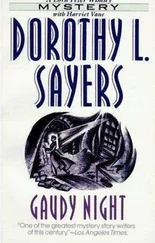‘I doot ye’ll no be hearin’ much there,’ said the landlord. ‘Mrs. Green that does his work is away home, but she knows juist naething at a’, except that when she arrived this mornin’ at 8 o’clock to put the place in order, he had went oot. And Mr. Ferguson that lives next to him was away to Glasgow by the first train.’
‘Ferguson?’ said Wimsey. ‘I think I’ve met him. Didn’t he do those mural paintings for the town hall at some place or other?’
‘Ay, he’s a verra gude penter. Ye’ll have seen him gaun aboot in his wee Austin. He has the stujo next to Campbell’s every summer.’
‘Is he married?’
‘Ay, but his wife’s away the noo, visitin’ wi’ friends in Edinbro’. I believe they du not get on so verra weel tegither.’
‘Who, Ferguson and Campbell?’
‘No, no, Ferguson and Mrs. Ferguson. But the ither’s true, too. He and Campbell had an awfu’ quarrel aboot a bit of wall of Ferguson’s that Campbell knocked down wi’ his car.’
‘I wonder if there is a single person in the Stewartry that Campbell didn’t have a row with,’ thought Wimsey, and made an addition to his list:
6. John Ferguson — about 36 — about 5 foot 10 inches — grass-widower — landscape and figures — row about a wall.
‘By the way,’ he went on, ‘is Jock Graham anywhere about?’
‘Och, Jock — he’s away oot. He didna come hame last nicht at a’. He said he might be fishin’ up at Loch Trool.’
‘Oho!’ said Wimsey. ‘Up at Loch Trool, is he? How did he go?’
‘I couldna say. I think the factor had invitit him. He’ll ha’ spent last nicht in Newton-Stewart, maybe, and went up wi’ the factor in the mornin’. Or he will ha’ been fishin’ the loch all nicht.’
‘Will he, though?’ said Wimsey. This put a new complexion on the matter. An active man might have driven the body up to the Minnoch and walked back to Newton-Stewart in time to keep his appointment, if that appointment was not an early one. But it would have to be, of course, for a day’s fishing, and Jock Graham liked to work by night.
‘Will he be back tonight, Joe?’
‘I couldna say at all,’ said the landlord, scattering his hopes at a blow. ‘They’ll maybe tak’ twae nichts if the fishin’s gude.’
‘H’m!’ said Wimsey. ‘And very nice, too. Well, I’ll be getting on.’
He paid his bill and came downstairs, accompanied by the landlord.
‘How’s Andy?’ he asked, casually.
‘Och, fine,’ said the other. ‘He’s in a great way, though, today. Some fellow’s pinched his push-bike. An’ the worst is, he had juist fitted it wi’ new tyres on both wheels.’
Wimsey, with the thumb on the self-starter, paused, electrified.
‘How’s that?’
‘It’s his ain fault. He will go leavin’ it aboot the place. It’ll be some o’ these trampin’ fellows that sells carpets, verra like. There’s naebody in Gatehouse wad du sic a thing.’
‘When did he miss it?’
‘This mornin’, when he was aff to schule. It’s a gude thing it wasna the motor-bike he’s always after me to be givin’ him.’
‘I daresay somebody’s just borrowed it,’ said Wimsey.
‘That’s so. It may turn up yet. Well, gude day to your lordship.’
Wimsey did not cross the bridge, but turned up the road to the railway station. He passed the turning on the left leading past Anwoth Old Kirk to the Creetown road, and followed the course of the Fleet till he came to a small lane on the right. At the end of this stood two little detached cottages, side by side, looking over a deep pool — in fact, the famous disputed pool in which Jock Graham had ducked the deceased Campbell.
Under normal circumstances, Wimsey would have expected to find both doors confidingly on the latch, but today the lower cottage, which was Campbell’s, had been locked — probably by the police. Wimsey peered in through all the ground-floor windows in turn. Everything seemed peaceful and in order as the charwoman had left it that morning. There was a sitting-room of bachelor appearance in front and a kitchen behind — the usual but and ben with a bedroom over. In addition, a glass-roofed studio had been built out beyond the kitchen. At the right-hand side, the shed that had housed the Morris stood empty, a fresh set of tyre-tracks in the dust showing where the car had been taken out that morning. Just beyond, a wooden gate led into an untidy little garden. From the end of the studio a party-wall of rough stone ran down, separating the yard and garden from those belonging to the other cottage, and Wimsey noticed a breach in the wall and the pile of debris which marked where Campbell had backed injudiciously while turning into the garage, and given cause for so much unneighbourly feeling.
Ferguson’s cottage was the mirror-image of Campbell’s, but his garden was neatly cared-for, and his garage was brand-new and built, regrettably, of corrugated iron. Wimsey pushed open the door and was confronted by a new and shining two-seater of a popular type.
This surprised him for a moment. Ferguson had taken the early train to Glasgow, and Gatehouse Station is six and a half miles from the town. Why had Ferguson not taken the car? He could easily have left it at the station till his return. It appeared to be a new toy; perhaps he had not cared to leave it in strange hands? Or perhaps he meant to be away a long time? Or perhaps —?
Wimsey lifted the bonnet thoughtfully. Yes, that was the explanation. A gap and some loose connections showed that the magneto had been taken away. Quite probably Ferguson had carried it off with him to Glasgow for repairs. How, then, had Ferguson got to the station? A friendly lift? the ’bus? Or a bicycle? The simplest way was to go and ask. At a small country station no passenger goes unnoticed, and one might as well make sure that Ferguson really had travelled by that train.
Wimsey closed the bonnet and shut the garage-door carefully after him. The house-door was open and he walked in and glanced around. It was as neat and non-committal as any house could be. Everything had been swept, dusted and tidied up by Mrs. Green, including the contents of the studio; for when the artist is away the charwoman will always play among the paint-pots, and no amount of remonstrance will prevent it. Wimsey glanced at some figure-studies piled against the wall, squinnied up his eyes at an elaborate and mannered piece of decorative landscape on the easel, noted casually that Ferguson got his painting materials from Roberson’s, glanced along a row of detective novels on the sitting-room bookshelf, and tried the lid of the writing-bureau. It was unlocked, and disclosed an orderly row of pigeon-holes, with everything in its place. Wimsey put down Ferguson as a man of an almost morbidly exact mentality. There was nothing here to throw any light on Campbell’s death, but he became all the more anxious to get hold of Ferguson. The way in which the cottages were built, detached and sharing one common entrance yard, ensured that everything which was done in the one could be overlooked from the other. If anything unusual had happened to Campbell the previous night, Ferguson could scarcely have failed to see something of it. And, on the other hand, if Ferguson had not seen it, then nobody had, for the two little houses stood remote from all the other neighbours, hidden at the bottom of the rough, leafy lane, with the Water of Fleet lipping by at the bottom of the gardens. If Jock Graham, indeed, had been fishing Standing-Stone Pool that night — but no! He was supposed to have gone to Loch Trool. Ferguson was the man. It would be advisable to get quickly upon the track of Ferguson.
Wimsey went back to his car and started away up the long hill road to Gatehouse Station, which lies at the edge of the Galloway hill-country, looking away over the Fleet Valley and the viaduct and frowned on by the lofty scarp of the Clints of Dromore.
Читать дальше












